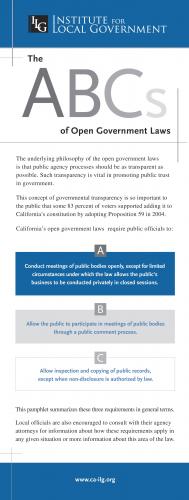Decision-Making Occurs At Meetings
Because of transparency requirements, virtually all of the conversations among a quorum of members of city councils, boards of supervisors and special district boards occur at public meetings.
This is also true for certain committees, commissions, and boards created by these governing bodies. The law strictly limits the circumstances under which conversations among elected and appointed officials may occur in private (known as “closed sessions”)
State law also requires notice of such meetings and that the agenda must be available for public review before the meeting.
At times, this may seem like a very cumbersome way to make decisions, particularly ones that seem insignificant, non-controversial, or not of great interest to the public.
However, it is important to remember the decision-making process is designed with an eye towards balancing a number of competing views.
Efficiency and speed are important, but in our democracy, public participation and transparency of government is paramount.
The open meeting laws are premised on the notion that transparency and the opportunity for public input are more important than speed.





